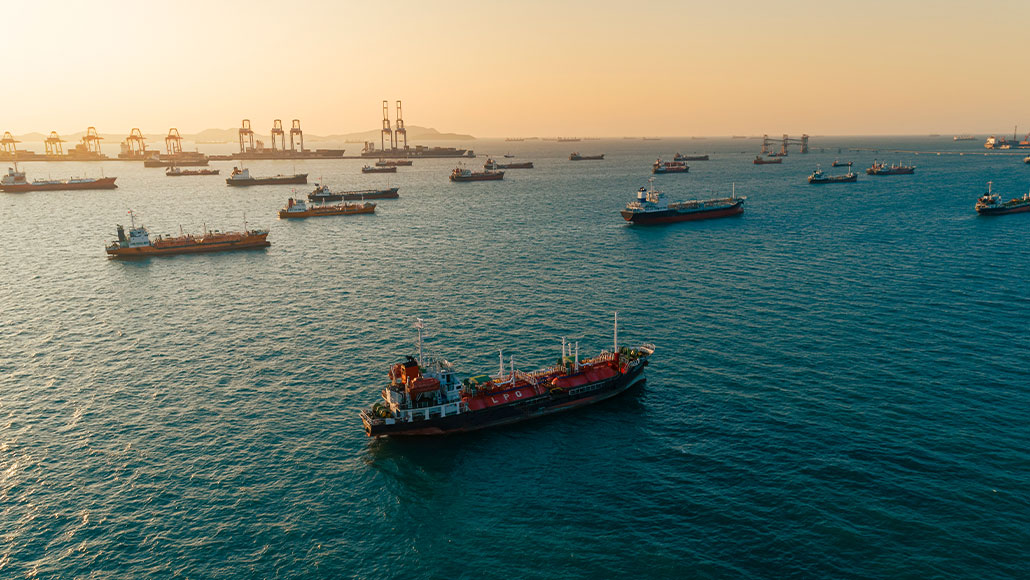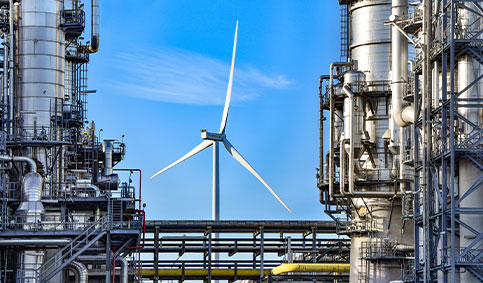Shipping
Policy plays a crucial role in decarbonising the shipping sector. We expect demand for liquefied natural gas (LNG) as a fuel in shipping to grow, alongside biofuels including liquefied biomethane and biodiesel. Consistent, robust and long-term policy frameworks are needed to stimulate demand for lower-carbon fuels to incentivise their production and supply.[1]
In 2023 at an international level, we welcomed the International Maritime Organisation’s (IMO) adoption of a revised greenhouse gas reduction strategy for international shipping that includes an ambition to reach net-zero emissions by or around 2050, supported by interim targets for 2030 and 2040. We called for the IMO to adopt a technical measure such as a fuel quality standard, which introduces a well-to-wake carbon intensity trajectory to drive decarbonisation of the energy used, to help achieve this ambition. We also advocated the use of financial mechanisms, such as a carbon price, to help reduce the price gap between fossil and alternative fuels, as well as the need for energy efficiency measures preferably based on energy consumption.
Our advocacy is mainly through industry groups including the Getting to Zero Coalition and the UK Chamber of Shipping. We also advocated at the International Transport Forum in 2023, calling for a net-zero emissions by 2050 target for shipping ahead of the IMO’s greenhouse gas strategy review. We are involved in industry groups that have observer status at the IMO including Ipieca, the Society for Gas as a Marine Fuel (SGMF), the Society of International Gas Tanker & Terminal Operators (SIGTTO), the International Bunker Industry Association (IBIA) and the Oil Companies International Marine Forum (OCIMF).
In 2023, we published a report called Decarbonising Shipping: All Hands on Deck 2.0, which was produced in collaboration with Deloitte.[2] The report provides views from across the shipping industry on the prevailing challenges and solutions to decarbonise shipping, while reviewing the progress that has been made. The report highlights the need for effective local and regional regulation to advance near-term impact on greenhouse gas emissions, while anticipating that global regulation will need to follow quickly to achieve a level playing field towards a net-zero emissions target. We use the report in our advocacy to demonstrate the call-to-action from industry for effective regulation at the international level.
In the EU, we supported the FuelEU Maritime Regulation proposal to introduce EU-wide, technology-neutral greenhouse gas intensity targets for shipping. The regulation was adopted in October 2023. We also support the inclusion of maritime in the EU Emissions Trading System. We advocate mainly through industry groups including FuelsEurope and SEA-LNG.
We provide more detail about our advocacy on some of these topics on our website.[3]

[1] Lower-carbon fuels, such as LNG and biofuels, when compared with conventional fuels.
[3] www.shell.com/sustainability/transparency-and-sustainability-reporting/advocacy-and-political-activity/climate-and-energy-transition-advocacy-updates.html. We also provide further information about decarbonising shipping on our website: www.shell.com/business-customers/marine/decarbonising.html









